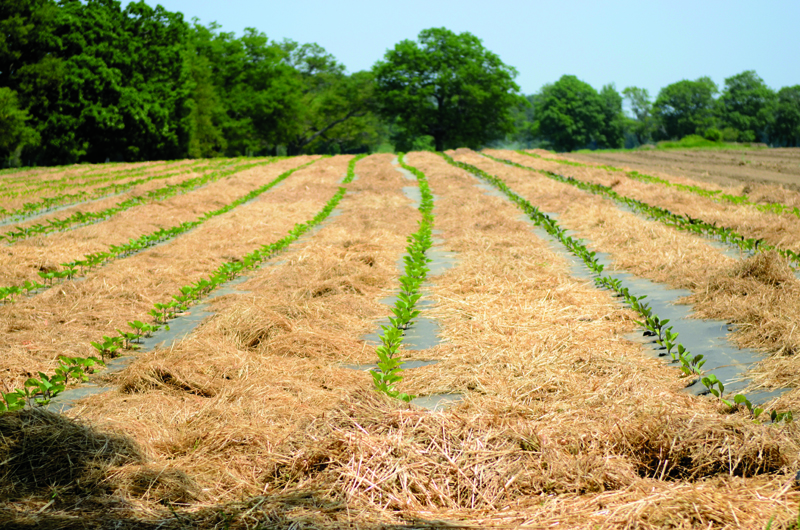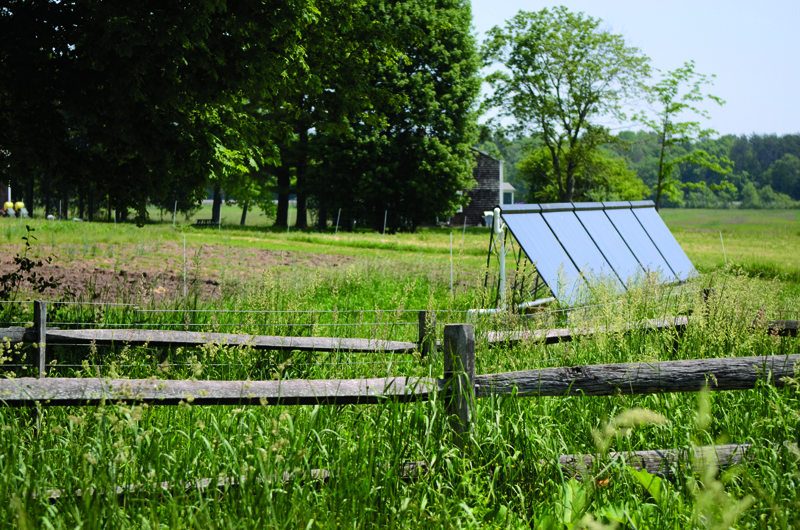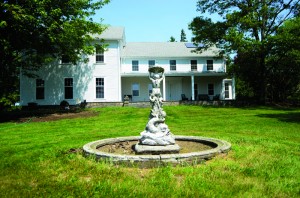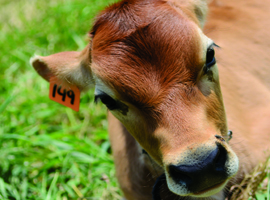Under the guidance of The Trustees of Reservations, Appleton Farms-one of the oldest continually run farms in the U.S.-overhauls its operations to achieve new levels of sustainability and, ultimately, a LEED Platinum certification. By, Andrea Fox
In 1998, appleton farms, the oldest continually run farm in the U.S., was bequeathed to The Trustees of Reservations. Today, Col.Francis R. Appleton, Jr. and his wife, Joan, would be happy to see their restored original porch furniture arranged so that one can overlook the farm and its 17th-century roots.
What might please the couple more than period details and displays of family heirlooms, however, is that Appleton Farms is today’s model for New England commercial-scale farming, as well as a marvel of land preservation. The Appletons’ incredible gift was for the purpose of restoring farming and preserving land as open space-The Trustees management has made this vision a reality.
“They are bringing back a working farm,” says Susanna Colloredo-Mansfield, a cousin of Joan Appleton. “She always wished it could be a place for families, like it was for me.” As a child, Colloredo-Mansfield would often go with her mother on calls to see Aunt Fanny Appleton, and then she visited with her adult cousins, Frank and Joan, “which was like heaven to me,” she says.
The Trustees’ organization-wide, carbon-neutrality goal, along with development efforts, has lead to Appleton Farms’ centuries-old operations, such as the dairy, to undergo a complete sustainability lift. The strategy has put the largest farm in the Greater Boston region on track to eliminate emissions-earning Appleton the gilded title Net Zero-in August 2011. The crowning achievement of this incredible undertaking came in August when the Green Business Council awarded the Old House rebuild LEED Platinum certification.
Agriculture is one of the most resource-consumptive industries and largest emitters of greenhouse gases, and scant farms can make Net Zero claims about their carbon footprints. The Old House, now The Trustees’ offices and Appleton Farms Center for Agriculture and the Environment, is also the first renovated building on the East Coast to boast the green building movement’s platinum achievement.
Underneath all of the old farm charm is a set of systems befitting the center of what Trustees Statewide Agriculture Director and former long-time Appleton Farms Manager Wayne Castonguay calls a “real working farm.” “We define real as economically viableÂ…It needs to support itself, and we’re doing that,” Castonguay says.
Solar-thermal and photovoltaic arrays produce renewable energy, the former heating water and the latter creating energy that runs the agricultural operations and even feeds the grid on the brightest days. Within the Old House, drastic energy cuts have been made, most without historic consequence, through a “deep energy retrofit.” Many original windows have undergone an energy rehab-making them 85 percent as efficient as new windows. Innovative strategies abound, like the addition of a solar tube running from the roof through the attic to cast sunlight on the office copy room and its hearth pine floor. Befitting a North Shore jewel, The Trustees restored Old House’s nostalgic bits, such as a newly uncovered section of the original 1794 wood clapboard exterior, with care for art and educational display.
From State-of-the-Art to All-Access
Moving with a tempo of historic richness in harmony with our green-inspired times, Appleton Farms runs on biodiesel-fueled equipment. There is an electric ATV to get around from one operation to another, and a firewood burner powers the commercial farm-to-table demonstration kitchen that opened in June without smoke or  particulates. One of the best energy retrofits, according to Castonguay, is a $1,200 heat exchanger system that captures natural waste heat from cow milking and reuses it later. “It’s a double payback,” he says, noting that all of the energy retrofits and upgrades have been cost-competitive-an essential attribute of successful farming. “We have 22 buildings to power,” he noted.
particulates. One of the best energy retrofits, according to Castonguay, is a $1,200 heat exchanger system that captures natural waste heat from cow milking and reuses it later. “It’s a double payback,” he says, noting that all of the energy retrofits and upgrades have been cost-competitive-an essential attribute of successful farming. “We have 22 buildings to power,” he noted.
At 1,000 acres, Appleton is the largest farm in the Boston area. Its beautiful walking trails and suite of public programs make it a popular destination for locals and travelers taken by Essex County. The grass rides are legendary as well; Oliver Wolcott of Hamilton, whose mother was an Appleton, is a regular visitor and wants to make sure everyone knows about the rides. “The fields are in great shape; it’s a very attractive place to visit,” he says.
Wolcott’s son maintains the fields and the equipment, so he has watched the transformation of Appleton Farms under The Trustees. He is impressed by Castonguay’s work and says, “Wayne knows everything, from the family genealogy to physics.
 “The Trustees have made it accessible to the public,” Wolcott continues, insisting that the organization has not changed anything. “There have been cattle there from the beginning.” He summarizes his thoughts on Appleton Farms: “The property hasn’t been transformed, and that’s what’s nice about it.”
“The Trustees have made it accessible to the public,” Wolcott continues, insisting that the organization has not changed anything. “There have been cattle there from the beginning.” He summarizes his thoughts on Appleton Farms: “The property hasn’t been transformed, and that’s what’s nice about it.”
On a Sustainable Path
Perhaps this soul stems from the farm’s 1636 roots. Thanks to The Trustees strategic plan for the property, it will also continue onward through time as an everlasting monument to North Shore land and our rural heritage. “It has a real soul, that farm-a peacefulness about the land you feel when you are there,” said Colloredo-Mansfield. At Appleton Farms, cows still graze the land, organic remains the everyday way to do business, and connecting people to land and animals is the everlasting mission.
The Appletons entrusted the farm after Joan’s passing, which was at a time when most farmers in the region were selling. Instead, they foresaw a better vision: returning the largest farm in the Greater Boston region to greatness, says Colloredo-Mansfield. “[Cousin Joan] had everything-monkeys, rabbits, sheep, and dogsÂ…it was unbelievable as a child,” she says.
Today, Appleton Farms’ dairy houses 40 cows, which produce 50,000 gallons of milk per year, the same number processed annually for its grass-fed beef service. The farm grows a vegetable bounty for community-supported agriculture (CSA) and for the new farm-to-table program.
To ensure agriculture remains part of the North Shore’s future, Appleton Farms’ dairy operations are solar-powered, and the cattle enjoy life free from hormones and with a range of fields to explore. The Massachusetts Department of Agricultural Resources is even pilot testing a plant- and soil-based milk house wastewater treatment system to address Title V regulations.
The farm produces for the second largest organic CSA in New England, with upwards of 600 shares. Farm-to-table workshops at Appleton Farms’ kitchens-there is a commercial kitchen inside and a second, open-air kitchen out the back door of the dining room-bring people closer to food and closer to farming, all under a plan that brings farming back to nature. The Center’s library, with its lifetime subscription to Ebscohost, a customizable research tool that accesses more than 300 databases, connects Appleton Farms to the world.
Annual sled dog races and farm animal discovery programs for children connect people to animals and their original place in land preservation. “They were here first,” says Colloredo-Mansfield, who credits her cousins Frank and Joan and their legacy of preserving agriculture and open lands as an influence since childhood. Mansfield’s own Hamilton property features a conservation restriction through Essex County Greenbelt.
Ensuring A Legacy
“We raised a lot of money to get the farm back on its feetÂ…the donors are wonderful-it’s almost there,” Colloredo-Mansfield says. More than $1.25 million and a $500,000 endowment have been committed. Support has continued. A “Farmhouse Formal” in mid June raised the remaining funds needed for the project. The event,  a formal “green tie” affair, included dancing and an auction. Thanks to an individual anonymous supporter enthusiastic about the Old House Project’s potential for LEED Platinum status, an additional $100,000 donation is funding additional photovoltaic (solar) arrays-scheduled to be constructed in Fall 2011-which will offset operations, including the new Dairy Processing Facility to be built this year, and earn the points needed for the prized designation.
a formal “green tie” affair, included dancing and an auction. Thanks to an individual anonymous supporter enthusiastic about the Old House Project’s potential for LEED Platinum status, an additional $100,000 donation is funding additional photovoltaic (solar) arrays-scheduled to be constructed in Fall 2011-which will offset operations, including the new Dairy Processing Facility to be built this year, and earn the points needed for the prized designation.
Sustainability touches all aspects of Appleton Farms’ landscape, from renewable energy to the new cattle barn and hay loft built with 90 percent recycled materials. These efforts will not end with The Trustees’ current strategic plan, according to Castonguay. “A wind turbine will be down the road,” he says.
Many credit Castonguay’s leadership for Appleton Farms’ resurrection. While he demonstrates little need for excessive praise, with respect to the gift and vision of Frank and Joan Appleton, he may be the enterprising son they never had. You can hear such romantic notions and more on the air at an everlasting farm.

